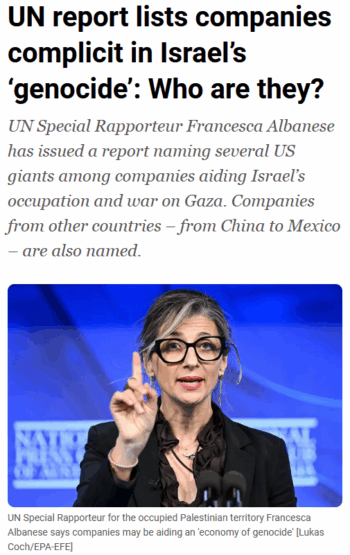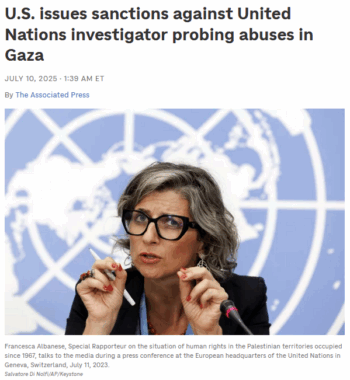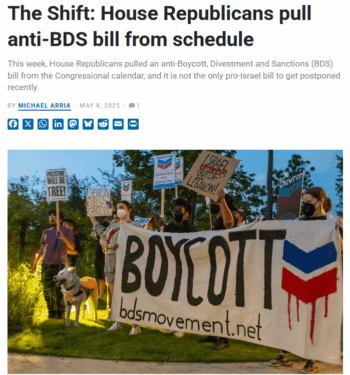‘People Don’t Want To Be Complicit in War Crimes’

Janine Jackson: Francesca Albanese, UN special rapporteur for the West Bank and Gaza, has called down all manner of official and unofficial grief for saying what any thinking person would know: that a mass extermination and displacement project, such as Israel is carrying out in Palestine, doesn’t fund itself.
As US citizens, we know we’re involved, that our “tax dollars” are used by politicians we may or may not have elected to do things that we don’t condone, much less endorse. But what US elite news media seem to hate above all things is the connecting of dots, the recognition that we are all related across borders and boundaries.
That the thing that brought US sanction was Albanese’s naming of defense companies providing weapons used by Israel’s military, makers of equipment used to bulldoze Palestinian homes, is telling. Watching corporate media try to maintain the notion that, yes, Citizens United said money is speech, and you can’t curtail that, but no, you absolutely cannot say that people might not want to support companies who are funding a genocide. Well, that’s telling about media as well.
Joining us now to talk about this is Iman Abid. She’s director of advocacy and organizing at the US Campaign for Palestinian Rights. She joins us now by phone. Welcome back to CounterSpin, Iman Abid.
Iman Abid: Thank you so much.
JJ: The statement in Albanese’s report, “While life in Gaza is being obliterated and the West Bank is under escalating assault, this report shows why Israel’s genocide continues: because it is lucrative for many”—I mean, it’s only in a weird world of elite media that that would be something that you can’t say. That should just be a point of information in our understanding, yes?
IA: At any point in time that we target or uplift the war crimes that these large corporations are partaking in, we’ve seen just how silenced or suppressed people are, and Francesca has now been a part of that. She’s brought a lot to light in this new document that has come out, information that many people, in various forms, have already uplifted, but has done a really incredible job at trying to both consolidate and make the information a lot more accessible. And so, since it is a lot more digestible to see, it’s easier to access. Weapons manufacturers and large corporations have been extremely disappointed in what the world is able to finally see.
JJ: Right. Transparency is their enemy.
IA: Yeah, exactly.

JJ: And you would think that journalists—whatever they want to say about it—would support the idea that the public can understand exactly what’s happening. And yet that’s not the response that we’ve seen, from certainly the US officially, but also from journalists. I don’t feel that they are celebrating this report in a way that one would hope.
IA: Absolutely. I think that the reality is that much of the documentation, and the notes that are provided to us for review in this report, showcase not just what has been going on, and what corporations have been enacting for the last two years, throughout the duration of the genocide, but rather for the last few decades. This information has been available to the public, available to journalists and reporters, for a really long time, and for whatever reason, people generally choose to still avoid it.
Now, whether or not they themselves—certain news outlets have partnerships with some of these corporations, and they’re keeping them quiet for that purpose, or if there’s any other reason where maybe they as individuals are profiting off of these corporations themselves, we’ve seen just how silent people are when it comes to uplifting the harms of these corporations.
JJ: What do you hope or think might be the impact? Because it seems, obviously, Marco Rubio saying, “Ah! Shut up! Sanctions!” is telling that this information is important. What do you hope might be used? How do you think it might be used?
IA: My hope is that, especially for the American people, in any point in time, when this administration tries to silence someone, when they implement sanctions or any of that, I really encourage people to take a look at their work. And Francesca Albanese is an incredibly profound, extraordinary being who has spent their career building up and bringing awareness to the atrocities happening to the Palestinian people. This report is only one aspect of the work that she’s been so committed to.

NPR (7/10/25)
And I think that people like Marco Rubio, and other people within the Trump administration, don’t want you to see this, because they themselves are, again, establishing partnerships, or have established partnerships, with these corporations. And even some of the members of Congress, who have also uplifted and supported the sanctions on Francesca Albanese, some of them are war profiteers. They are the ones who are both building up the contracts with the federal government, or supporting the contracts with the federal government, to keep these corporations alive and thriving.
I think the report itself mentions on every single page just how Palestine is being used as this sort of military technology incubator. It’s an opportunity for these companies to use their work, and to see how it works on the Palestinian people. They’re almost using us as dispensable objects for their weapons. And I think that a lot of that is uplifted in this document.
And because of the atrocities that are being highlighted, and because of the direct connection to the United States Congress, the United States administration, it just shows an incredibly bad light on the US. And it also showcases just how harmful the partnerships and the military investment really is, across not only the US, but across the globe.
JJ: Elite media seem vigorously invested in policing lines between “us” and “them,” but it’s not working. Support for Palestinian human rights is growing, even as it’s being seriously criminalized. So where are you seeing daylight? Because I see a lot of people being extremely brave and using information, such as in this Albanese report, to say, “We’re armed. We’re armed with information, and we’re not going to buy the line that we’re being sold.”
IA: Absolutely. I think the movement has grown exponentially, and I think it’s simply because of the fact that we have watched this livestreamed genocide take place. And I think that when people see the level of death, when people see the level of atrocity, especially for those who’ve sat on social media platforms and watched the video footage and documentation of what’s been happening across Gaza, it’s become extremely difficult to deny what’s actually happening.
And people are moved. People are moved to speak up, people are moved to stand up, even against the faces of oppression, the Zionist forces that are trying to silence people, and they’re choosing to say that I don’t want to be on the wrong side of history, I want to take a stand on this, and not just a stand in the streets, but a strategic stand that allows me and my community to actually move towards getting this genocide to end, and for us to stop upholding these atrocities being committed against Palestinians.

Al Jazeera (6/26/24)
It’s been deeply fortunate that so many reports have come out, even just the last two years alone, not only of the weapons that have been used on Palestinians, but just what specific correlation there is between the US, the complicity of the US, and what’s been happening across Gaza and the rest of the West Bank, and even in parts of Jerusalem. And so people are starting to really see that direct line between themselves as US taxpayers, and where and what their money is being spent on, and just how it’s actually being used to abuse, assault and murder Palestinians. And people don’t want to be on that side. People don’t want to be complicit. I don’t think anyone wants to be complicit in war crimes being committed, and mass genocides being committed.
And so I think we’re starting to see just how people are really trying to take that next step, and acknowledge there are different avenues that people can take to really get things to stop. And whether it’s the targeting of weapons manufacturers like Caterpillar or Hyundai or Elbit, whoever is actually equipping Israel with the technology and the software and the technology that’s being used to destroy homes, whatever it may be, people are using these sorts of reports to help uplift the documentation that already exists, to bring attention to these corporations that we, as the United States, as US taxpayers, are investing in.
And they’re choosing to say that we don’t want this. We don’t want this to continue. And we, again, as taxpayers can do something about it.
JJ: And I’ll end on the media thing, that it calls out the media hypocrisy, because when folks were pouring out their Bud Light because they had a trans person in an ad, media were sort of celebrating: Oh, you’re using your consumer voice, you’re speaking with your dollars, right? And then out of the other side of their mouth, they want to say, Well, BDS is criminal. You’re not allowed to not shop at a store, or whatever, that supports genocide. So to me, it tells the tale on US media’s understanding of what a consumer gets to do with their voice.
IA: Absolutely. Again, yes, the exceptionalizing of Palestine, the exceptionalizing of the BDS movement, still exists, but we are seeing a shift. We are seeing people break beyond that, and actually start to question and start to ask themselves, why has the BDS movement actually existed for as long as it has?
Again, boycotting, divestment, sanctions is not an area that’s just particular to the Palestinian movement. It’s been used with South Africa, it’s been used in other parts of the world, because it is something that actually works. When we stop the transfer of dollars to these corporations, and to these entities like Israel that are actually upholding the genocide and the mass expulsion of Palestinians, we do start to see the shifting of it.

Mondoweiss (5/8/25)
And the Israeli economy, as a matter of fact, is actually beginning to decline, because of the level of education and the expansion of the Palestinian solidarity movement across the globe. And people are trying to be wiser about where they’re spending their dollars. And so I think that we’re not in the exact place we want to be just yet, but we are moving the needle towards where we want to go, and people are being wiser about where money is going.
And so while governments and elected officials are really still working hard to suppress any sort of BDS movement, whether it’s through the anti-BDS proposals, or if it’s through the sanctioning of certain individuals, the people themselves are starting to actually say: “Well, wait a minute. Why are you choosing to suppress us for engaging in this, when we know it’s the right thing to do?”
And members of Congress are starting to be a little more alert, and start to say, “Wait a minute, this isn’t actually a winning issue for me if I choose to engage in it. And it’s not necessarily something that I should really be pushing for.” Because people are becoming more attentive. And it’s allowing us, again, to move the needle where we really want to see us going.
JJ: We’ve been speaking with Iman Abid from the US Campaign for Palestinian Rights. They’re online at USCPR.org. Iman Abid, thank you so much for joining us this week on CounterSpin.
IA: Thank you so much.
Janine Jackson is FAIR’s program director and producer/host of FAIR’s syndicated weekly radio show CounterSpin. She contributes frequently to FAIR’s newsletter Extra!, and co-edited The FAIR Reader: An Extra! Review of Press and Politics in the ’90s (Westview Press).
FAIR, the national media watch group, has been offering well-documented criticism of media bias and censorship since 1986. We work to invigorate the First Amendment by advocating for greater diversity in the press and by scrutinizing media practices that marginalize public interest, minority and dissenting viewpoints. As an anti-censorship organization, we expose neglected news stories and defend working journalists when they are muzzled. As a progressive group, FAIR believes that structural reform is ultimately needed to break up the dominant media conglomerates, establish independent public broadcasting and promote strong non-profit sources of information.
